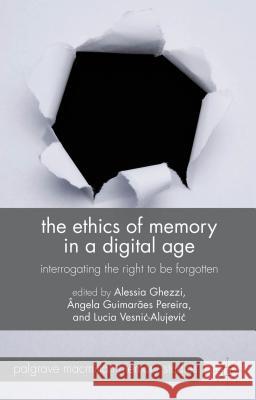The Ethics of Memory in a Digital Age: Interrogating the Right to Be Forgotten » książka
The Ethics of Memory in a Digital Age: Interrogating the Right to Be Forgotten
ISBN-13: 9781137428448 / Angielski / Twarda / 2014 / 143 str.
The Ethics of Memory in a Digital Age: Interrogating the Right to Be Forgotten
ISBN-13: 9781137428448 / Angielski / Twarda / 2014 / 143 str.
(netto: 326,62 VAT: 5%)
Najniższa cena z 30 dni: 327,68
ok. 16-18 dni roboczych.
Darmowa dostawa!
Following the trend of sharing more personal information, and associating being on-line with being 'on-life', many people are now demanding the ownership and control of their data across all processing phases, including the erasure of their presence on the web. In Europe, recent proposals for regulation include an explicit 'Right to be Forgotten'. This right stated in the European Commission Proposal for Regulation COM 2011/12 has not emerged without controversy. It is being criticised on several grounds, including clashing with other rights, such as freedom of expression, as well as setting the terrain for censorship. Besides the purely legal aspects of the proposed provisions, the chapters of this volume discuss how those legal provisions correspond in practice to worldviews and how individual and collective memory should be governed. They look into the deeper consequences of such provisions to construction of identity, culture and community formation, and how such a right affects how, what and why individuals, groups and societies remember and forget.











